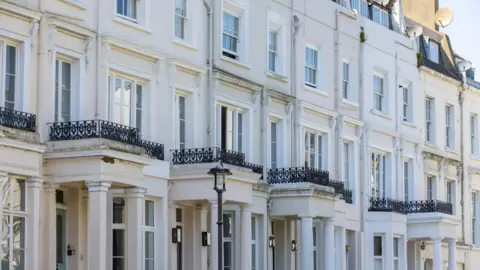Unlawful renting of short-term lets on the rise
 Getty Images
Getty ImagesThe government has been urged to take action after research found more than half of London's short-term holiday let properties are being rented out unlawfully.
A report by Central London Forward, a partnership of inner city boroughs, revealed more than 50% of the 117,000 short-term lets listed across the capital in 2024 were booked for more than 90 days a year, in breach of regulations.
Westminster City Council leader Adam Hug said: "This concentration has a profound effect on our local communities."
A government spokesman said: "We will introduce a short-term let registration scheme to reap the benefits of a thriving tourist economy while protecting the spirit of our communities."
'Waste and noise complaints'
Landlords cannot legally rent out their homes in the capital for more than 90 nights a year under regulations.
They are only allowed to let their homes out for more than 90 nights a year, on short-term lets, if they receive planning permission from the council.
Speaking at the Centre for London think tank's annual housing summit on Wednesday, Mr Hug said his borough was "at the epicentre of the problem", with short-term lets concentrated in "the West End, Bayswater, Lancaster Gate and parts of Pimlico".
He added: "It can hollow out long-term residents, making neighbours subject to significant noise disruption, fly-tipped waste linked to short-term let properties.
"But it also impacts the council services which have to pick up the waste, respond to the noise complaints and deal with pressure in the local housing market, as we see private rents rise year on year."
Central London Forward's report, seen by the Local Democracy Reporting Service (LDRS), found the number of short-term lets in London has risen over the last decade.
In 2015, there were fewer than 30,000 short-term lets in London, which more than doubled throughout 2016 to 60,000, peaking at over 100,000 in 2019.
The numbers of short-term lets then "fell dramatically" in 2020 at the height of the Covid-19 pandemic, before making a "steady recovery," the report added.
'Completely inadequate'
The report calls on ministers to force short-term let rental websites "to share individualised, unit-level data with local authorities and the government" and to introduce a mandatory national registration scheme for the sector.
"At the moment, it isn't possible for local authorities to effectively, at scale, enforce the existing regulations," said Mr Hug.
He added that holiday let websites will often "mask where the properties are, putting it on a street a couple of roads away, and not being clear what building it's in".
The Labour councillor added: "It means that hard-pressed planning enforcement teams are really struggling to build the evidence base to get the court to enforce the 90-day rule.
"In order to better regulate the market, and to empower local authorities, we really do need national government to step up."
The report was endorsed by Tom Copley, Sir Sadiq Khan's deputy mayor for housing, who said with 65,000 homeless households in London living in temporary accommodation, "we need to bring those properties back into use as long-term rented properties, or long-term properties for people to buy and live in as owner-occupiers".
A government spokesman told the LDRS the short-term let sector has seen rapid growth in recent years.
They said: "This can bring economic benefits to the economy and tourism industry, but we know that having excessive concentrations of short-term lets in an area can drive up housing costs and harm local communities.
"That's why we have abolished the furnished holiday lets tax regime so that landlords are no longer incentivised by the tax system to rent homes as holiday lets.
"We continue to consider further action."
Listen to the best of BBC Radio London on Sounds and follow BBC London on Facebook, X and Instagram. Send your story ideas to [email protected]
